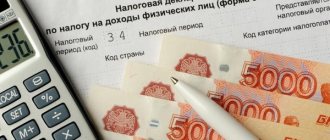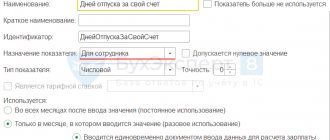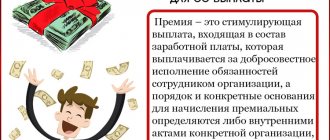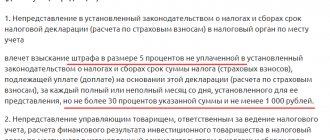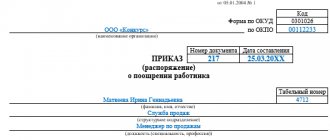Documenting
An organization may provide for the payment of one-time bonuses in its internal documents:
- employment contract (paragraph 5, part 2, article 57 of the Labor Code of the Russian Federation);
- collective agreement (part 2 of article 135 of the Labor Code of the Russian Federation);
- in a separate local document of the organization (Regulations on remuneration, Regulations on bonuses, etc.) (Part 2 of Article 135, Article 8 of the Labor Code of the Russian Federation).
In this case, a one-time bonus may be an integral part of the remuneration system. Accordingly, one-time bonuses for production results can be taken into account when calculating average earnings.
However, one-time bonuses may not be part of the organization’s remuneration system and are assigned only by order (order) of the manager.
The basis for the accrual of any one-time bonus is the manager’s order to reward an employee (Form No. T-11) or a group of employees (Form No. T-11a). The order is signed by the head of the organization. The employee (employees) must be familiarized with the order against signature (Section 1 of the instructions approved by Resolution of the State Statistics Committee of Russia dated January 5, 2004 No. 1).
What requirements are met?
Before paying a one-time bonus, the director of the company must take into account some restrictions:
- if the company has a trade union, then all provisions related to bonuses must be agreed upon with its members;
- it is allowed to increase payments, but not reduce them if they are stipulated in the employment contract;
- If the head of the company decides to assign payments to employees, then the organization’s accountant must draw up a special certificate, and the head issues an official order.
The amount of additional payments may vary slightly for different employees. The manager independently determines which employee will receive a particular payment at a certain point in time.
Accounting
The procedure for reflecting one-time bonuses in accounting depends on the sources from which they are paid:
- due to expenses for ordinary activities;
- at the expense of other expenses;
- due to net profit;
- due to the formation of the cost of fixed assets.
As a rule, in accounting, bonuses accrued for labor performance are classified as expenses for ordinary activities (clauses 5 and 7 of PBU 10/99). Record the accrual of such bonuses as follows:
Debit 20 (08, 23, 25, 26, 29, 44) Credit 70
– the bonus is accrued at the expense of expenses for ordinary activities (the bonus is included in the cost of the fixed asset).
Non-production one-time bonuses (for anniversaries, holidays, etc.) are classified as other expenses in accounting (clause 11 of PBU 10/99). Reflect their accrual as follows:
Debit 91-2 Credit 70
– the bonus is accrued at the expense of other expenses.
If the source of payment of bonuses (both production and non-production) is retained (net) profit, make the following entry:
Debit 84 Credit 70
– the bonus is accrued at the expense of net profit.
This procedure follows from the Instructions for the chart of accounts (account 70).
When are funds paid?
One-time bonuses are assigned if there are compelling reasons, so they are most often transferred in the following situations:
- an employee has increased their productivity;
- due to the active work of the citizen, the number of customers in the store increased;
- a production specialist has increased the competitiveness or quality of the products created;
- Bonuses are paid before holidays or various significant events in the lives of employees.
The decision to assign such a payment is made only by the head of the enterprise, therefore it is not his direct responsibility. Often, funds are assigned to employees who replaced other employees, performed actions not provided for in their job description, or were involved in optimizing business processes in the company.
Personal income tax and insurance premiums
Regardless of the taxation system that the organization uses, personal income tax must be withheld from the entire premium amount (subclauses 6 and 10, clause 1, article 208 of the Tax Code of the Russian Federation).
Situation: in what month should the amounts of one-time bonuses be included in the personal income tax base: in the month of accrual or in the month of payment?
The calculation of personal income tax depends on whether the bonus is industrial or not.
Non-production one-time bonuses (for example, for an anniversary, a holiday) are not part of the salary and, therefore, do not relate to labor costs. Therefore, include their amount in the personal income tax tax base of the month in which they were paid (subclause 1, clause 1, article 223 of the Tax Code of the Russian Federation).
The calculation of personal income tax on one-time production bonuses, in turn, depends on the period for which they are accrued:
- month;
- quarter;
- year;
- upon the occurrence of a specific event (for example, a one-time bonus for the successful completion of a project). One-time production bonuses paid upon the occurrence of a specific event should be included in the personal income tax tax base at the time of payment to the employee (subclause 1, clause 1, article 223 of the Tax Code of the Russian Federation).
For the amount of a one-time bonus for labor performance, add:
- contributions for compulsory pension (social, medical) insurance (Part 1, Article 7 of Law No. 212-FZ of July 24, 2009);
- contributions for insurance against accidents and occupational diseases (clause 1 of article 20.1 of the Law of July 24, 1998 No. 125-FZ).
This rule applies regardless of whether the bonus is provided for in the employment contract or not (letter of the Ministry of Health and Social Development of Russia dated August 12, 2010 No. 2622-19).
Situation: is it necessary to charge insurance premiums for the amount of one-time bonuses that were given to employees for an anniversary or holiday? That is, these payments are not related to labor performance.
Answer: yes, it is necessary.
According to the general rules, insurance premiums are subject to all payments that the employer accrues within the framework of labor relations (Part 1, Article 7 of the Law of July 24, 2009 No. 212-FZ, Clause 1 of Article 20.1 of the Law of July 24, 1998 No. 125-FZ). And since bonuses are awarded to employees (i.e., people with whom the organization has entered into employment contracts), then we can consider that these are payments within the framework of labor relations (Article 16 of the Labor Code of the Russian Federation).
In addition, one-time bonuses are not named in the closed lists of payments that are exempt from:
- contributions for compulsory pension (social, medical) insurance (Article 9 of the Law of July 24, 2009 No. 212-FZ);
- contributions for insurance against accidents and occupational diseases (Article 20.2 of the Law of July 24, 1998 No. 125-FZ).
Thus, insurance premiums must be calculated on the amounts of one-time premiums. It does not matter for what reason the bonus is paid - for achieving certain labor results or in connection with some event (anniversary, holiday, etc.).
This approach is also confirmed by arbitration practice (see, for example, Resolution of the Presidium of the Supreme Arbitration Court of the Russian Federation dated June 25, 2013 No. 215/13, Resolution of the FAS Volga District dated March 6, 2012 No. A12-10291/2011).
Advice: if you are ready to argue with inspectors, then insurance premiums for one-time bonuses that are not related to work performance may not be charged.
The following argument will help in the dispute.
Bonuses for an anniversary (holiday, etc.) cannot be considered paid within the framework of labor relations. And therefore there is no reason to charge insurance premiums. It is explained this way.
The mere fact that there is an employment relationship between employees and the organization does not indicate that all payments accrued to employees represent payment for their labor. Thus, one-time bonuses paid for an anniversary, holiday, etc. do not depend on the employee’s qualifications, complexity, quantity, quality and conditions of the work he performs. And accordingly, they are not remuneration for labor and an element of remuneration. If so, then they cannot be recognized as paid within the framework of the labor relationship.
There are examples of court decisions confirming this approach (see, for example, decisions of the Federal Antimonopoly Service of the North-Western District dated September 20, 2013 No. A66-15138/2012, Central District dated November 6, 2012 No. A64-1493/2012).
At the same time, given the ambiguity of arbitration practice, it is difficult to predict the outcome of litigation on this issue. Judges can side with both the organization and the inspectors.
The amount of the one-time bonus is included in the tax base for personal income tax (subclause 6, clause 1, article 208 of the Tax Code of the Russian Federation).
Reasons
The basis for paying a bonus to an employee may be a petition from the immediate supervisor, drawn up in writing.
In his memo, the employee’s boss writes about the labor successes and achievements of a particular employee, and asks him to encourage him.
The motive for encouragement can be very different. For example, performing complex strategically important tasks, overfulfilling the amount of work, fulfilling extra-curricular assignments.
Often an employee receives a bonus in connection with an upcoming anniversary or some memorable date. In this situation, the basis may be the order of the manager.
The reason for awarding bonuses to an employee is always written in small letters in the order. For example, “for the success achieved in work.” In the column “Grounds for awarding” it is written which document became the basis for the award (“petition of the workshop manager”).
Income tax: general procedure
One-time bonuses are taken into account when calculating income tax if two conditions are simultaneously met:
- bonuses are provided for in the labor and (or) collective agreement, as well as local acts (paragraph 1 of article 255 and paragraph 21 of article 270 of the Tax Code of the Russian Federation);
- bonuses relate to incentive payments and depend on labor indicators (work experience, official salary or production results) (clause 2 of article 255 of the Tax Code of the Russian Federation).
This position is confirmed by the Ministry of Finance of Russia in letters dated March 15, 2013 No. 03-03-10/7999, dated May 28, 2012 No. 03-03-06/1/281 and the Federal Tax Service of Russia in letter dated August 13, 2014 No. GD-4-3/15717.
Situation: when calculating income tax, is it possible to take into account the costs of paying one-time bonuses that are not related to the employee’s performance of his job duties (for example, for an anniversary, holiday, for winning competitions, etc.)?
Answer: no, you can't.
One-time bonuses that are not related to the employee’s performance of his job duties (for an anniversary, a memorable date, for winning professional skills competitions, for conferring honorary titles, etc.) do not reduce the tax base for income tax. This is explained by the fact that such awards:
- are not related to the production activities of the organization (not aimed at generating income), and therefore do not meet the criterion of economic justification of costs (clause 1 of Article 252 of the Tax Code of the Russian Federation, letter of the Ministry of Finance of Russia dated March 15, 2013 No. 03-03-10/7999 , dated February 22, 2011 No. 03-03-06/4/12);
- are not incentive payments related to labor performance and the employee’s performance of a job function, therefore they cannot be taken into account in expenses as part of remuneration (Article 255 of the Tax Code of the Russian Federation, letter of the Ministry of Finance of Russia dated April 24, 2013 No. 03-03-06/1 /14283, dated December 12, 2012 No. 03-03-06/4/114).
If bonuses do not reduce the tax profit of the organization, then permanent differences arise in accounting (clause 4 of PBU 18/02). Permanent differences lead to the formation of a permanent tax liability (clause 7 of PBU 18/02).
Advice: there are arguments that allow organizations to take into account, when calculating income tax, the costs of paying one-time bonuses that are not related to the employee’s performance of his job duties. They are as follows.
Any bonuses that an organization pays to its employees are considered incentive payments (Part 1 of Article 129 of the Labor Code of the Russian Federation). At the same time, the organization has the right to independently establish an incentive system for employees (Article 144 of the Labor Code of the Russian Federation). In turn, incentive accruals provided for by the labor and (or) collective agreement are taken into account when calculating income tax (clauses 1, 2 of Article 255 of the Tax Code of the Russian Federation).
Therefore, if all of the above conditions are met, the organization has the right to take into account non-production bonuses (for example, accrued for holidays) as part of labor costs.
However, in order to comply with the requirement of reasonableness of costs provided for in paragraph 1 of Article 252 of the Tax Code of the Russian Federation, certain conditions for assigning non-production bonuses should be provided.
For example, as a justification for paying a bonus and its focus on generating income, you can indicate that bonuses for holidays are not paid to employees who have disciplinary offenses. Therefore, the payment of such a bonus is aimed at increasing employee interest in the results of production activities. A similar condition for the payment of a bonus when resolving a dispute in court was a sufficient argument for the lawful attribution of such payments to labor costs (see, for example, the resolution of the Federal Antimonopoly Service of the Moscow District dated February 24, 2010 No. KA-A40/702-10).
It is also possible to justify the economic orientation of bonuses paid to non-smoking employees. Quitting smoking reduces lost working time. Therefore, payments to non-smoking employees are stimulating. And if such bonuses are provided for in collective or employment agreements, they can be taken into account as expenses when calculating income tax. The legality of this position was confirmed in the resolution of the Federal Antimonopoly Service of the East Siberian District dated June 24, 2014 No. A33-1611/2013.
In addition, if non-production bonuses are initially provided for in an employment (collective) agreement, then a potential employee takes into account the possibility of receiving them when assessing the feasibility of working in a particular organization. Therefore, such incentive payments can help attract the necessary specialists to the organization. This means that these costs are economically justified. This was indicated by the FAS Moscow District in its resolution dated June 17, 2009 No. KA-A40/4234-09. By ruling of the Supreme Arbitration Court of the Russian Federation dated October 23, 2009 No. VAS-13115/09, the transfer of the specified case for consideration by the Presidium of the Supreme Arbitration Court of the Russian Federation was refused.
However, if an organization uses this point of view and takes into account the amount of non-production bonuses in expenses when calculating income tax, then, most likely, it will have to defend its point of view in court.
Include the amount of bonuses for labor performance in tax accounting as part of labor costs (clause 2 of Article 255 of the Tax Code of the Russian Federation).
Employer's liability for violations
Often, employees have to deal with the fact that the employer does not pay one-time bonuses, although the need for these transfers is determined by internal local acts or a collective agreement. In this case, refusal to pay bonuses is a violation on the part of the director of the company.
Under such conditions, employees can file a complaint with various government inspection authorities. The best way is to write an application to the labor inspectorate. Specialists of this service will conduct an inspection, the main purpose of which will be to identify violations of workers’ rights by the organization’s management. Although the transfer of one-time bonus payments is not subject to legal requirements, if this obligation is enshrined in regulatory documents, then the manager is obliged to follow these standards.
Income tax: accrual method
If an organization uses the accrual method, the procedure for recognizing expenses in the form of bonuses depends on whether they are direct or indirect expenses.
If bonuses relate to indirect expenses, then they must be recognized at the time of accrual (clause 2 of Article 318, clause 4 of Article 272 of the Tax Code of the Russian Federation). If one-time bonuses are a direct expense, then take them into account as products, works, and services are sold (paragraph 2, paragraph 2, article 318 of the Tax Code of the Russian Federation). Organizations providing services can take into account direct expenses at the time of their accrual (paragraph 3, paragraph 2, article 318 of the Tax Code of the Russian Federation).
As a rule, bonuses are classified as indirect expenses (Article 318, paragraph 3 of Article 320 of the Tax Code of the Russian Federation). An exception is bonuses paid to employees directly involved in the production of products, performance of work or provision of services (for example, bonuses to production workers). They are classified as direct costs. Such rules are established in paragraph 7 of paragraph 1 of Article 318 of the Tax Code of the Russian Federation.
Situation: can a production organization classify all one-time bonuses as indirect costs?
Answer: no, it cannot.
Organizations independently determine the list of direct expenses (clause 1 of Article 318 of the Tax Code of the Russian Federation, letters of the Ministry of Finance of Russia dated January 26, 2006 No. 03-03-04/1/60, Federal Tax Service of Russia dated February 24, 2011 No. KE-4-3 /2952). However, dividing costs into direct and indirect must be economically justified. Otherwise, tax authorities may recalculate income tax.
Thus, the bonus accrued to employees directly involved in production should be taken into account as part of direct expenses. Refer the bonus for the administration of the organization to indirect expenses.
An example of reflection in accounting and taxation of a one-time bonus accrued for production results. The payment of the bonus is provided for in the employment contract. The bonus was paid out of expenses for ordinary activities. When calculating income tax, an organization uses the accrual method
CJSC Alfa applies a general taxation system (accrual method). The organization pays contributions to compulsory pension (social, medical) insurance in accordance with the general procedure. Contributions for insurance against accidents and occupational diseases are calculated at a rate of 0.2 percent. The organization takes these contributions into account when calculating income tax in the month of accrual.
ZAO Alfa entered into an agreement with manager A.S. Kondratyev fixed-term employment contract for the duration of a specific job (project). The term of the employment contract is from February 1 to March 31. The employment contract provides for the payment of a one-time bonus for the successful completion of the project.
The project was successfully completed on time, March 31st. Kondratiev was awarded a bonus of 50,000 rubles. On the same day, the bonus was paid to the employee.
The bonus will be included in the personal income tax base in March. Kondratiev has no children, so he is not provided with standard tax deductions.
The accountant reflected the accrual and payment of bonuses as follows:
Debit 20 Credit 70 – 50,000 rub. – a one-time bonus was awarded to the employee;
Debit 20 Credit 69 subaccount “Settlements with the Pension Fund for the insurance part of the labor pension” – 11,000 rubles. (RUB 50,000 × 22%) – contributions to finance the insurance part of the labor pension are calculated from the premium amount;
Debit 20 Credit 69 subaccount “Settlements with the Social Insurance Fund for social insurance contributions” – 1450 rubles. (RUB 50,000 × 2.9%) – compulsory social insurance contributions are calculated from the premium amount;
Debit 20 Credit 69 subaccount “Settlements with FFOMS” – 2550 rubles. (RUB 50,000 × 5.1%) – contributions for compulsory health insurance to the Federal Compulsory Medical Insurance Fund are calculated from the premium amount;
Debit 20 Credit 69 subaccount “Settlements with the Social Insurance Fund for contributions to insurance against accidents and occupational diseases” – 100 rubles. (RUB 50,000 × 0.2%) – contributions for insurance against accidents and occupational diseases are calculated from the premium amount;
Debit 70 Credit 68 subaccount “Personal Income Tax Payments” – 6,500 rubles. (RUB 50,000 × 13%) – personal income tax is withheld from the premium amount;
Debit 70 Credit 50 – 43,500 rub. (50,000 rubles – 6,500 rubles) – the bonus was paid to Kondratiev minus personal income tax.
The amount of the premium and insurance premiums from it is included in indirect costs.
In March, Alpha’s accountant took into account the following as expenses:
- the amount of the accrued bonus is 50,000 rubles;
- the amount of contributions for compulsory pension (social, medical) insurance and contributions for insurance against accidents and occupational diseases - 15,100 rubles. (RUB 11,000 + RUB 1,450 + RUB 2,550 + RUB 100).
For the anniversary
An order for a bonus is drawn up in accordance with a unified form or sample adopted by the organization. But first you need a basis for bonuses.
This could be a submission addressed to the chief executive. For example, the employee’s direct supervisor writes: “To V.I. Sidorov. The accountant of Vesna LLC turns fifty years old on May 10, 2011. His experience in the organization is ten years.”
The employer can use incentives as a good motivation for an employee to achieve increased work efficiency and discipline. In this material we outline how to correctly draw up an order to reward an employee. We will also provide the completed sample.
Types of employee incentives
An employee can be rewarded not only in material form. The main types of incentives used in practice:
- announcement of gratitude;
- cash bonus;
- nomination for the title of the best in the profession;
- issuance of a valuable gift;
- awarding a certificate of honor.
The list, in accordance with Art. 191 of the Labor Code of the Russian Federation, is not closed; the bonus system is established for each specific enterprise in local regulations. For special achievements, a presentation for state awards may follow.
Order on monthly bonuses
In addition to one-time incentives, the employer has the right to issue orders for periodic bonuses. With this document, he indicates a certain frequency of payment, for example, stipulate that additional remunerations are paid along with wages monthly in the amount of a certain percentage of wages.
https://www.youtube.com/watch?v=-jc2VwBcUZk
Sometimes an employer, when determining the form of remuneration at an enterprise, opts for a salary-bonus system. In this case, an administrative document is also issued, which sets out the conditions for payment of bonuses.
Which is better – a ready-made form or your own?
As a rule, it is more convenient to use a ready-made form, since it provides:
- convenience in terms of design - no need to waste time developing your own sample;
- ease of working with the document in the accounting department - all key details are already registered;
- and most importantly, thanks to the indication of details, the inspectors will have fewer questions about bonus payments, which in large companies can amount to large amounts - on the order of hundreds of millions of rubles.
Bonus rules
Most often, employers use a bonus system to reward employees. In order to create such conditions in his organization, the manager should:
- calculate the amount of remuneration;
- plan the conditions for issuing bonuses;
- think over the procedure for their calculation;
- highlight the necessary indicators and criteria.
The amount of the bonus is specified in the employee incentive order. It can be expressed:
- as a fixed value;
- as a certain percentage of salary.
Another calculation option is using the entered surcharge factor.
The mentioned reward order can be issued as a reward for increased labor productivity and various achievements.
Such a bonus should be organized on the basis of calculated performance indicators. If this information is correctly defined and provided to staff, employees will see clearly defined goals, rather than a vague concept of hard work that must be achieved in order to receive a raise.
So, for example, for a call center operator this may be a certain number of successful calls.
Such bonuses are most often formed as a percentage of the salary amount. And the frequency of payments can be different - once a year, six months or a month.
In order for bonuses to look like incentives, the employer must approve specific circumstances for issuing them. For example:
- for achievements in the workplace;
- for the employee's birthday;
- if its activities set record labor values;
- the required length of service has been achieved, etc.
The specific motive for incentives must be prescribed in the order. In addition, it must be one-time in nature. Usually, when promoting, they choose a bonus in the form of a percentage of the amount earned or a fixed bonus.
